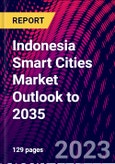1. An Outline of the Market
1.1. Market Definition
1.2. Market Segmentation
3. Research Methodology and Approach
3.1. Research Process
3.2. Primary Research
3.2.1. Service/Solution Providers
3.2.2. End-users
3.3. Secondary Research
3.4. Market Size Estimation
5. Forces of the Market Constituents
5.1. Factors/Drivers Impacting the Growth of the Market
5.2. Market Trends for Better Business Practices
10. Industry Risk Analysis
10.1. Demand Risk Analysis
10.2. Supply Risk Analysis
11. Global Economic Outlook: Challenges for Recovery and its Impact on Indonesia Smart Cities Market
11.1. Ukraine-Russia Crisis
11.2. Potential US Economic Slowdown
20. Competitive Model: A Detailed Inside View for Investors
20.1. Market share of Major Companies Profiled, 2022
20.2. Competitive Positioning
20.3. Business Profiles of Key Enterprises
20.3.1. Cisco Systems, Inc.
20.3.1.1. Detailed overview
20.3.1.2. Assessment of Key Offerings
20.3.1.3. Analysis of Growth Strategies
20.3.1.4. Exhaustive Analysis on Key Financial Indicators
20.3.1.5. Recent Developments
20.3.1.6. Huawei Technologies Co., Ltd.
20.3.1.7. Microsoft Corporation
20.3.1.8. Oracle Corporation
20.3.2. Schneider Electric
20.3.3. Siemens AG
20.3.4. IBM Corporation
20.3.5. General Electric
20.3.6. Honeywell International Inc.
20.3.7. Telefonaktiebolaget LM Ericsson
20.3.8. Other key players
21. Indonesia Smart Cities Market Outlook & Projections, Opportunity Assessment, 2022 to 2035
21.1. Market Overview
21.2. Market Revenue by Value (USD Million) and Compound Annual Growth Rate (CAGR)
21.3. Year-on-Year (Y-o-Y) Growth Trend Analysis
21.3.1. By Functional Area
21.3.1.1. Sub-segmented by Smart Transportation, Market Value (USD Million), CAGR & Y-o-Y Growth Trend, 2022-2035F
21.3.1.1.1. Smart Ticketing, Market Value (USD Million), CAGR & Y-o-Y Growth Trend, 2022-2035F
21.3.1.1.2. Traffic Management System, Market Value (USD Million), CAGR & Y-o-Y Growth Trend, 2022-2035F
21.3.1.1.3. Freight Information System, Market Value (USD Million), CAGR & Y-o-Y Growth Trend, 2022-2035F
21.3.1.1.4. Others, Market Value (USD Million), CAGR & Y-o-Y Growth Trend, 2022-2035F
21.3.1.2. Sub-segmented by Citizen Services, Market Value (USD Million), CAGR & Y-o-Y Growth Trend, 2022-2035F
21.3.1.2.1. Smart Education, Market Value (USD Million), CAGR & Y-o-Y Growth Trend, 2022-2035F
21.3.1.2.2. Smart Public Safety, Market Value (USD Million), CAGR & Y-o-Y Growth Trend, 2022-2035F
21.3.1.2.3. Smart Healthcare, Market Value (USD Million), CAGR & Y-o-Y Growth Trend, 2022-2035F
21.3.1.2.4. Smart Street Lighting, Market Value (USD Million), CAGR & Y-o-Y Growth Trend, 2022-2035F
21.3.1.2.5. Others, Market Value (USD Million), CAGR & Y-o-Y Growth Trend, 2022-2035F
21.3.1.3. Sub-segmented by Smart Building, Market Value (USD Million), CAGR & Y-o-Y Growth Trend, 2022-2035F
21.3.1.3.1. Building Energy Optimization, Market Value (USD Million), CAGR & Y-o-Y Growth Trend, 2022-2035F
21.3.1.3.2. Emergency Management, Market Value (USD Million), CAGR & Y-o-Y Growth Trend, 2022-2035F
21.3.1.3.3. Parking Management System, Market Value (USD Million), CAGR & Y-o-Y Growth Trend, 2022-2035F
21.3.1.3.4. Others, Market Value (USD Million), CAGR & Y-o-Y Growth Trend, 2022-2035F
21.3.1.4. Sub-segmented by Smart Utilities, Market Value (USD Million), CAGR & Y-o-Y Growth Trend, 2022-2035F
21.3.1.4.1. Distribution Management System, Market Value (USD Million), CAGR & Y-o-Y Growth Trend, 2022-2035F
21.3.1.4.2. Substation Automation, Market Value (USD Million), CAGR & Y-o-Y Growth Trend, 2022-2035F
21.3.1.4.3. Advanced Metering Infrastructure, Market Value (USD Million), CAGR & Y-o-Y Growth Trend, 2022-2035F
21.3.1.4.4. Others, Market Value (USD Million), CAGR & Y-o-Y Growth Trend, 2022-2035F
21.3.1.5. Others, Market Value (USD Million), CAGR & Y-o-Y Growth Trend, 2022-2035F
21.3.2. By End User
21.3.2.1. Healthcare Sector, Market Value (USD Million), CAGR & Y-o-Y Growth Trend, 2022-2035F
21.3.2.2. Transportation Sector, Market Value (USD Million), CAGR & Y-o-Y Growth Trend, 2022-2035F
21.3.2.3. Government Bodies, Market Value (USD Million), CAGR & Y-o-Y Growth Trend, 2022-2035F
21.3.2.4. Construction Industry, Market Value (USD Million), CAGR & Y-o-Y Growth Trend, 2022-2035F
21.3.2.5. Utilities Sector, Market Value (USD Million), CAGR & Y-o-Y Growth Trend, 2022-2035F
21.3.2.6. Others, Market Value (USD Million), CAGR & Y-o-Y Growth Trend, 2022-2035F








